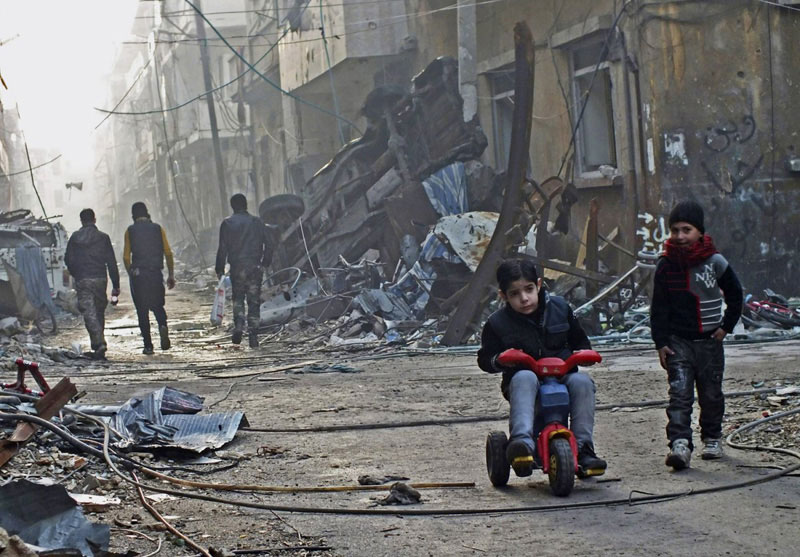Australia/Israel Review
Six years of hell
Mar 24, 2017 | Matthew Brodsky

Matthew Brodsky
Six years ago, on March 6, 2011, Syrian state security forces arrested 15 young boys for spray painting anti-regime graffiti on a wall in the southern city of Daraa. Their prolonged detention prompted peaceful demonstrations in the city that were met by the regime’s brutal crackdown, including live fire and tear gas. By the time the children were released – beaten, bloodied, burned and with their fingernails pulled out – the flashpoints between the Syrian security services and the protesters had already claimed many lives. Their funerals became rallying points for further protests and more regime violence. The smouldering calls for political reform became a fiery chorus demanding an end to Bashar al-Assad’s rule and the descent toward civil war continued.
Having reached the six-year anniversary, the death toll is now counted by the hundreds of thousands with a refugee crisis tallied in the millions. The catastrophe in Syria remains a dark stain on the soul of humanity that challenges previously held norms and assumptions. While many who early on in the crisis urged American action based solely on humanitarian grounds were rebuffed, they still clung to the belief that there was some magic number of civilian casualties that would finally spur the world to action. Apparently, no such number exists.
Despite the use of chemical warfare; the uncovering of mass graves; the Amnesty International report of the regime conducting a mass hanging of 13,000 prisoners in just one prison; a UN report detailing how in the city of Aleppo alone, “warplanes targeted hospitals, bakeries and schools in a non-stop bombing campaign that lasted for months”- not to mention countless other individual and state-sanctioned atrocities and war crimes – the only sound heard in the Western capitals was that of crickets.
To be sure, American foreign policy tends not to be a reaction to strictly humanitarian situations. It isn’t constructed by the American Society for the Prevention of Cruelty to Animals and sold to the masses as a sad commercial in which Sarah McLachlan plays “In the Arms of an Angel” while images of mistreated animals flash across the screen. Yet beyond the argument that the United States should intervene as “an act of geopolitical hygiene,” as Bret Stephens describes in his 2014 book, America in Retreat, there were compelling national-security concerns in Syria that would only worsen over time.
To that end, many others, including myself, argued for early intervention on both strategic and humanitarian grounds. We were rebuffed by those on both sides of the political aisle who said it wasn’t America’s fight, that it was a religious war the United States shouldn’t be involved in, and while the loss of human life was tragic, it didn’t represent a threat to the United States or a core American interest. It was further argued that there was no sense toppling a regime and ultimately incurring the wrath of the people. It tempted the Pottery Barn rule – “You break it, you own it” – that leads to nation building.
The Tendency to Overcorrect Foreign Policy
When it comes to the Middle East, newly elected American presidents have a tendency to veer toward overcorrection. George W. Bush came into office in early 2001 and wanted nothing to do with the region as Bill Clinton’s seven-year Israeli-Palestinian peace process exploded into unbridled terrorism a few months earlier. Eight years later, Barack Obama was elected with an “outstretched hand” policy. He promised to withdraw US forces from Iraq and Afghanistan, lessen America’s footprint in the Middle East, and correct what he saw as the unfortunate plague of foreign-military adventurism.
The Middle East, however, is never shy about presenting its own lessons, regardless of presidential intentions. Both George W. Bush and Barack Obama’s policies were shaped by seismic events beyond their control. For Bush, it was the 9/11 terrorist attacks; for Obama, it was the 2011 Middle East uprisings that engulfed the region, initially referred to by the more sanguine title of the “Arab Spring.” No template existed for dealing with those challenges and both presidents appeared to possess opposite instincts when formulating responses.
As the crisis in Syria enters its seventh year, the results of the naysayer arguments that won the political debate have been tallied: The deplorable lack of Western leadership in Syria created a predictable vacuum first filled by Hezbollah and Iran, and finally Russia, all of whom keep Assad’s regime on life support. It also allowed for the reconstitution of al-Qaeda in Iraq under the name of the Islamic State (ISIS). They established their caliphate capital in the northern Syrian city of Raqqa and committed acts of barbarism so appalling it would make Caligula blush. Added to the toxic Syrian stew are various Sunni and Shi’ite militias, some Islamist and others less so, most of whom are backed by other regional powers fighting to influence the country’s future.
Three years after Frederic Hof stepped down from his State Department post as adviser to former Secretary of State Hillary Clinton on Syrian political transition, he reflected on the lessons he learned from the standpoint of 2015:
My failure to predict the extent of Syria’s fall was, in large measure, a failure to understand the home team. In August 2011, Barack Obama said Assad should step aside. Believing the president’s words guaranteed decisive follow-up, I told a congressional committee in December 2011 that the regime was a dead man walking. When the president issued his red-line warning, I fearlessly predicted (as a newly private citizen) that crossing the line would bring the Assad regime a debilitating body blow. I still do not understand how such a gap between word and deed could have been permitted. It is an error that transcends Syria.
The Self-Inflicted Wound and Putin’s Trojan Horse
For a president who eschewed force for finesse with his own form of overcorrection, it turned out that Barack Obama was clearly overmatched and subsequently outplayed by both Russia and Iran. Charles Krauthammer spotted the trend early: “Obama imagined that his silver tongue and exquisite sensitivity to Islam would persuade the mullahs to give up their weapons program. Amazingly, they resisted his charms, choosing instead to become a nuclear power.” As Hof also understood, the White House saw the problem as essentially one of communications, where Iran and Syria didn’t yet comprehend that they were on the wrong side of history.
He recalled how Vladimir Putin got the better of Obama in Syria: “For nearly two years, Washington had chased Moscow diplomatically in the belief that the Kremlin’s soothing words about supporting political transition in Syria were truthful. That which was obvious to many – Russia’s desire to perpetuate al-Assad in office – is now jarringly clear to the administration.”
This was before it was fully understood that for Obama, when it came to the Middle East, the only game in town was Iran and the nuclear deal he hoped to achieve. And Iran made clear that Syria was its non-negotiable core interest that the West must respect. Obama publicly acceded to the demand by the end of 2015, agreeing to “respect” Teheran’s regional “equities.” As such, Barack Obama’s Syria policy was merely an afterthought, subordinated to the Iran file.
The case of the president’s self-inflicted wound from his self-imposed red line provides a rather illustrative example of being outmanoeuvred. In 2013, President Obama ignored the wishes of most of his staff and turned to Moscow to remove Assad’s chemical weapons. He then turned to the American people and sold the plan as an ingenious victory of diplomacy, which he hailed soon after in a speech at West Point with the doctrinaire phrase, “Just because we have the best hammer does not mean that every problem is a nail.” In a 2016 interview he described that decision as a source of deep satisfaction for him. “I’m very proud of this moment,” he told Jeffrey Goldberg of the Atlantic. It was “as tough a decision as I’ve made-and I believe ultimately it was the right decision to make.”
The lifeline Putin offered, however, turned out to be the Russian reins of a Trojan horse that only required a dash of strategic patience to spring. At the same time, as the United States gave up leverage to Iran in the nuclear negotiations, Russia profited from the process. It made sure the final agreement provided its newly wealthy Persian client with the freedom to purchase an unending colourful range of Russian weapons systems. With the deal finalised, Putin waited two months before springing forth from the Trojan horse into the Syrian fray with a massive military build-up in September 2015.
Meanwhile, Assad continues to use chlorine gas as a weapon against his people and Iran has learned that it can practise its own strategic patience. Iran knows it can enhance its regional position while improving its ballistic missiles and nuclear centrifuges and then spring forth in around a decade, when the deal expires, as a fully-weaponised nuclear state with an industrial-sized program. And all Israel got was a lousy T-shirt.
Some analysts have long argued that the most coherent interpretation of the previous administration’s behaviour is that Barack Obama was committed to boosting the Iranians as a stabilising force in the Middle East. That case is most compellingly made by Tony Badran, a research fellow at the Foundation for the Defense of Democracies, as well as Lee Smith and Michael Doran, both senior fellows at the Hudson Institute.
Doran, a former deputy assistant secretary of defence and former senior director of the National Security Council, further argued that Russia’s newly enhanced regional position was part and parcel of President Obama’s broader strategy. In his published response to Doran, Dennis Ross, a former special assistant to President Obama from 2009-2011, who served in senior positions related to the Middle East for several US administrations, disagreed with Doran’s premise but largely supported his conclusions. That is to say, whether by design or by accident, the result of President Obama’s eight-year overcorrection in foreign policy is the dramatically enhanced influence and position of both Russia and Iran, and the diminished standing of the United States and its allies.
Foreign Policy at a Crossroad
Now, in the early months of his presidency, Donald Trump finds himself at a fork in the road in terms of foreign policy. When it comes to Syria, there are no good options available today. What’s left to ponder recalls a scene from the Hollywood blockbuster Argo, where CIA agents Tony Mendez and Jack O’Donnell (played by Ben Affleck and Bryan Cranston) bring their rescue plan to CIA director Stansfield Turner. Unconvinced, he asks, “You don’t have a better bad idea than this?” to which O’Donnell replies emphatically, “This is the best bad idea we have sir.” As Tony Mendez understood at the time, “There are only bad options; it’s about finding the best one.”
The rationale for American action was always there along with the attendant warning that the United States would eventually have to get involved, only the choices then would be far worse and under even more complicated circumstances. At the beginning of the crisis, it was a localised conflict; it has now been transformed into a global war of jihad. While those on the political right argued that the Muslim Brotherhood would take over if Assad was toppled, the West’s collective dithering over what to do about Damascus helped produce “Jihad Central” in Syria, a magnet for international Islamists of a more ostentatious and dangerous ideological stripe.
There were those on the political left who argued that what happened over there didn’t threaten American interests; however, as the refugee crisis and global attacks perpetrated by ISIS and its sympathisers attest, the line regarding the misapplication of Las Vegas rules rings true: What happens in Syria won’t stay in Syria. And for those who warned about the Pottery Barn rules and wanted to avoid regional blame for any involvement, Syria has long been shattered. By clinging to the status quo or working to keep Assad in power the United States appears to be in league with Moscow rather than opposing Russian efforts.
After six years of unbridled Syrian carnage, the crisis isn’t a Republican or Democrat problem; rather, it is a profound moral failing and example of being on the proverbial wrong side of history, par excellence. The United States is in need of a Goldilocks policy – solutions in between the way too hot and way too cold spectrum. As Donald Trump weighs his options, there is the gravitational pull of putting his personal stamp on the manic presidential tradition of overcorrection. Or there is the opportunity to learn the proper lessons from history and from America’s successes and failures abroad. One can only hope he chooses the latter.
Matthew RJ Brodsky is a Senior Middle East analyst at Wikistrat and former Director of Policy at the Jewish Policy Center in Washington, DC. © The National Interest (nationalinterest.org), reprinted by permission, all rights reserved.
Tags: Russia






